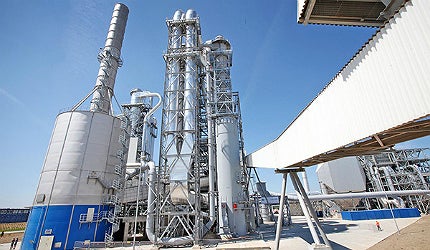
SWEDSPAN Polska, a Polish subsidiary of the SWEDSPAN Group, opened a new state-of-the-art ultra thin high density fibreboard (UT-HDF) production plant in September 2011. The factory, located in Bielsk Podlaski, Poland, is one of the most innovative UT-HDF production facilities in the world.
The production complex, which includes a sawmill and a value added production unit, was officially opened in May 2012. It was built with an investment of €140m ($182m).
The UT-HDF factory is situated in Orla, about seven miles south-east of Bielsk Podlaski, close to the Polish border with Belarus. This location was chosen because of its proximity to the raw material sources.
The ultra thin hardboard produced by the factory is supplied to Polish, Scandinavian and Lithuanian furniture manufacturers, in addition to IKEA, Swedspan’s parent company, for fabricating lightweight furniture.
Production capacity and UT-HDF plant construction
Swedspan obtained a construction permit for its UT-HDF mill in June 2010. Construction on the project was officially launched 30 days later. It was completed on time, and the factory achieved hot start in June 2011. Shift production was started in September of the same year.
The total site is 120ha in area, with the production complex occupying 60ha. The buildings cover an area of 48,000 square metres. The highest point at the factory is the WESP chimney, which stands 65m tall.
Annual production capacity of the UT-HDF plant is 250,000 cubic metres of raw boards. An integrated sawmill was commissioned at the site in the first quarter of 2012, to supply timber to the factory, as well as to the furniture manufacturers co-operating with IKEA. The produced wood will also be sold to other firms present in the Polish market.
Annual planks production capacity of the sawmill is 60,000 cubic metres and sort-out capacity is 350,000 cubic metres.
The value added production unit is the third building block of the production complex, where the panels are cut to size and foiled. Its annual production capacity is 80,000 cubic metres of foiled boards.
The project has created jobs for about 250 people; more than 85% of them are from Podlaskie region.
Equipment at Bielsk Podlaski’s UT-HDF factory
The UT-HDF production complex is equipped with specially engineered and fabricated machines supplied by leading companies from Germany, Finland, Estonia and the Czech Republic.
The plant is installed with a 23m long and 2.85m wide continuous press line, supplied by German machinery manufacturing company Dieffenbacher. Rated at two metres a second, it is reportedly the fastest UT-HDF production line ever assembled.
Metso, a company based in Finland, supplied a complete set of front-end system for the plant. The scope of contract included delivery, installation and commissioning of the machinery for preparation of logs into fibre, electrical and process control systems, and steel structures. The company also supplied and installed a Defibrator system.
The front-end system is designed to produce superior quality fibre at lower manufacturing costs and environmental impact. The wood yard is fitted with GentleFeed infeed system. It is used to feed logs into EasyTyre barking drum, a bark removal machine.
The log sorting system, supplied by Holtec, is used to identify and separate saw logs from industrial logs. HewSaw has supplied the R200 Saw Machine, which processes the sorted logs at the speed of 120m/min. Valon Kone has supplied its VK5048HD debarker machine which is fitted with a hydraulic tool pressure and designed to debark small and lightweight logs.
The added production unit is installed with one of the most advanced cut-to-size lines. It can produce up to 74 cubic metres of cut boards each hour.
Manufacturing at Swedspan Polska’s Polish plant
Related project
Gillette Razor Production and Packaging, Poland
In August 2004 Gillette Poland International began construction of a new 92,600m² manufacturing and packaging facility.
Low grade pulp wood sourced from local forests is used to manufacture UT-HDF at the Swedspan Polska factory. The logs are first debarked and then chipped. After cleaning process, which is used to remove mineral content, the chips are heated up with hot water and steam. They are then put in a refiner for disintegration into fibre.
The produced fibres are added with glue. They are then dried up and shaped into a mat. In order to ensure full curing of the glue, the mat is compressed in two steps, first in a cold state and then at a high temperature. The output is the board with good surface qualities and first-class thickness tolerances.
The thickness of the UT-HDF produced at the factory ranges from 1mm to 3mm, while the master board formats measure 1.87m to 2.85m in width and 4.8m to 6.3m in length.
Environmentally sustainable solutions
The UT-HDF factory is built as per the prevailing environmental regulations in Poland. About 90% of the water used in manufacturing process is recycled and re-used. The production plant has near zero wastage of wood.
An integrated biomass power plant produces enough thermal energy to cover the entire heat energy requirements of the factory. It meets up to one-fourth of power consumption by the plant. The biomass plant utilises the wastes produced during the manufacturing process.
Related content
Stora Enso Ostroleka Mill Expansion, Poland
Stora Enso is a renewable materials and packaging company with its headquarters in Finland and Sweden.
Suominen Flexible Packaging Slitter Installation, Poland
Finland’s Suominen Flexible Packaging, a major flexible packaging material supplier in northern Europe, installed a second Proslit slitter at its Grodzisk Mazowiecki factory in Poland in May 2005.
Packaging lightweights – ultra-light and thin packaging innovations
Amid constant financial pressure and consumer demands for greener and more sustainable packages, the packaging industry is in a constant battle to save on costs and production materials.











